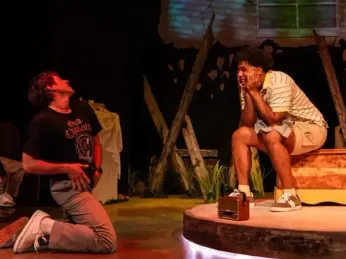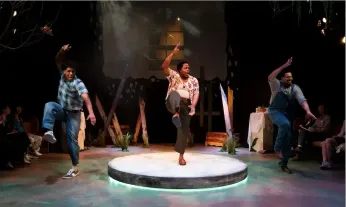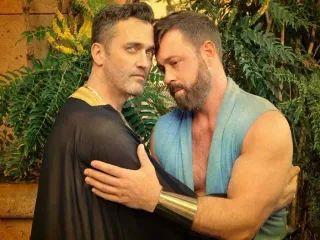
July 29, 2025
‘The Magnolia Ballet’ at Ashby Stage - Shotgun Players’ sweat inequity sizzles
Jim Gladstone READ TIME: 1 MIN.
The history is as oppressive as the humidity in the rural Georgia of playwright Terry Guest’s “The Magnolia Ballet,” a simultaneously dreamy and nightmarish fugue of gay romance and generational trauma now playing at Shotgun Players’ Ashby Stage in Berkeley.
Guest’s ambitious, non-linear script is a bit short on narrative momentum and thematic crispness, but director and choreographer Aejay Antonis Marquis’ richly layered production is intellectually and emotionally enveloping.
The audience is welcomed to the performance space as if convening for a ritual by actor Devin A. Cunningham, who is billed as Apparition and morphs into several distinct spirits throughout the evening.
Scenic designer Imani Wilson’s heavy magnolia boughs and lighting designer Michael D. Combs’ ever-shifting ambiance draw us into a realm of timeless solemnity spiked with moments of piercing contemporary humor.

Fathers and sons
Contemporary teenagers Ezekiel (Jaden Griffin, yearning and open-hearted) and Danny (Nicholas René Rodriguez, frightened and feral) are more than just friends: They share an awkward sexual attraction, and a last name. Ezekiel “Z” Mitchell is Black; Danny Mitchell, white.
While collaborating on a school project about the Civil War, it becomes clear that their families’ pasts are stingingly intertwined. There’d be irony in describing this pair as classmates.
Guest adds poetic complexity to his script by writing both boys’ fathers to be played by a single actor; here Drew Watkins, who reveals glints of tenderness beneath a carapace of machismo.
Danny’s dad is openly racist when alone with his son, and even more sneeringly, condescendingly so when Z comes over to study. Z’s dad, out of both racial animosity and a creeping sense of the boys’ mutual attraction, makes it clear he’d prefer they not spend time together at all.
Danny, who is less comfortable with his queer feelings than Z, subconsciously shores up his confidence by assuming a dominant role in their flirtations and sexual encounters.
Both playwright and audience enter disconcertingly blurry territory here: When Black and white men have sex together, is racism or “race play” inherently present? How have queerness, Blackness, and manliness been perceived and entangled throughout history?
Present tense
The expressive, modernist movement that Marquis has created for his cast makes them articulate beyond their characters’ voices. Their jerks and swoons, lunges and retreats belie the play’s stifling social environment.
Similarly, wildly unexpected interludes featuring clips of Britney Spears videos and “Gone with the Wind” snap audience members back to the here-and-now, insisting that they think about the play in present tense rather than being lulled into the superficial safety of what at times feels like an old-time Deep South ghost story.
Throughout “The Magnolia Ballet,” Guest saturates the air with difficult questions, refusing to precipitate easy answers. The audience is left to sweat it out.
‘The Magnolia Ballet’ through Aug. 10. $20-$78. Shotgun Players’ Ashby Stage. 1901 Ashby Ave., Berkeley. www.shotgunplayers.org



